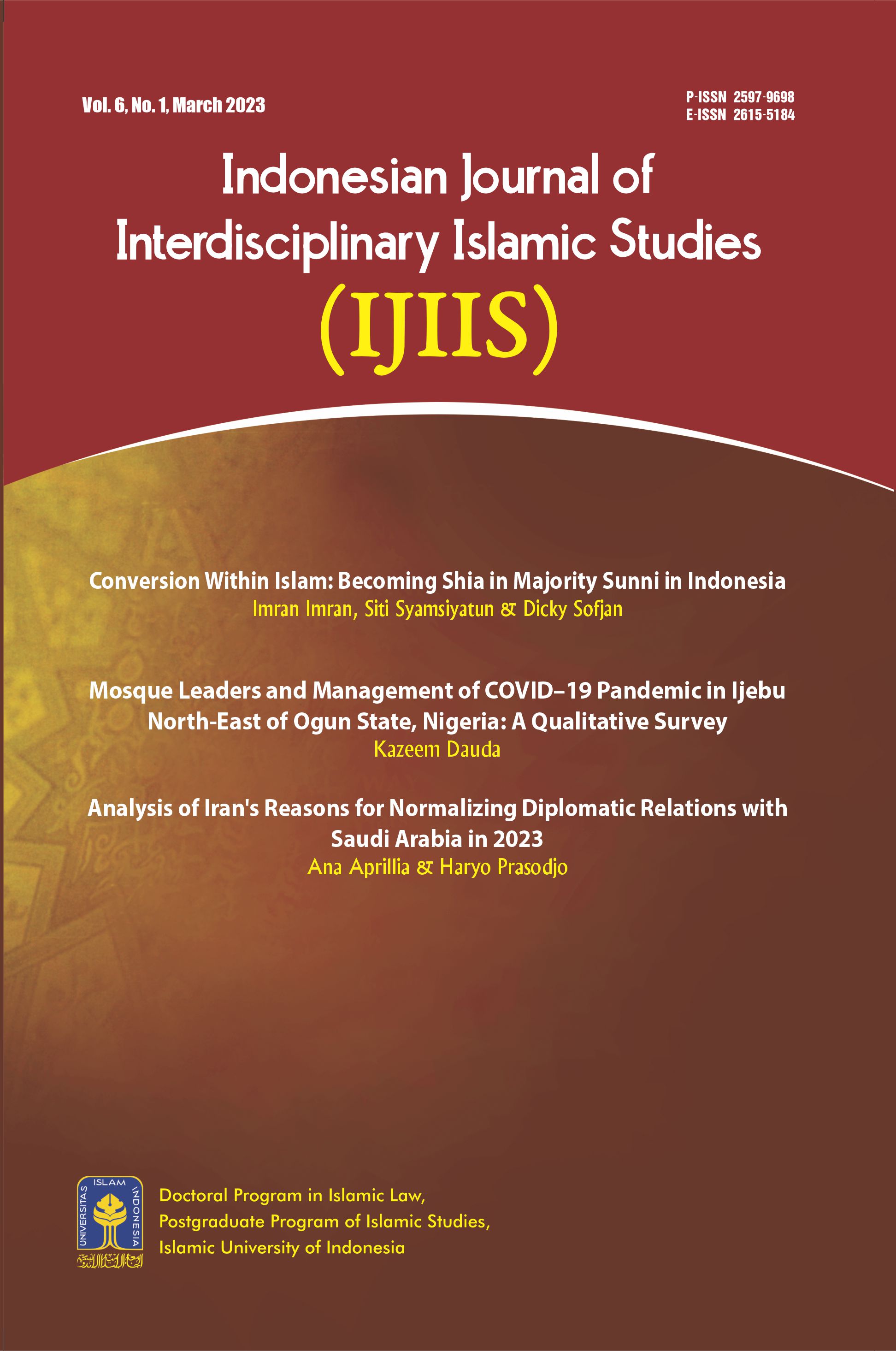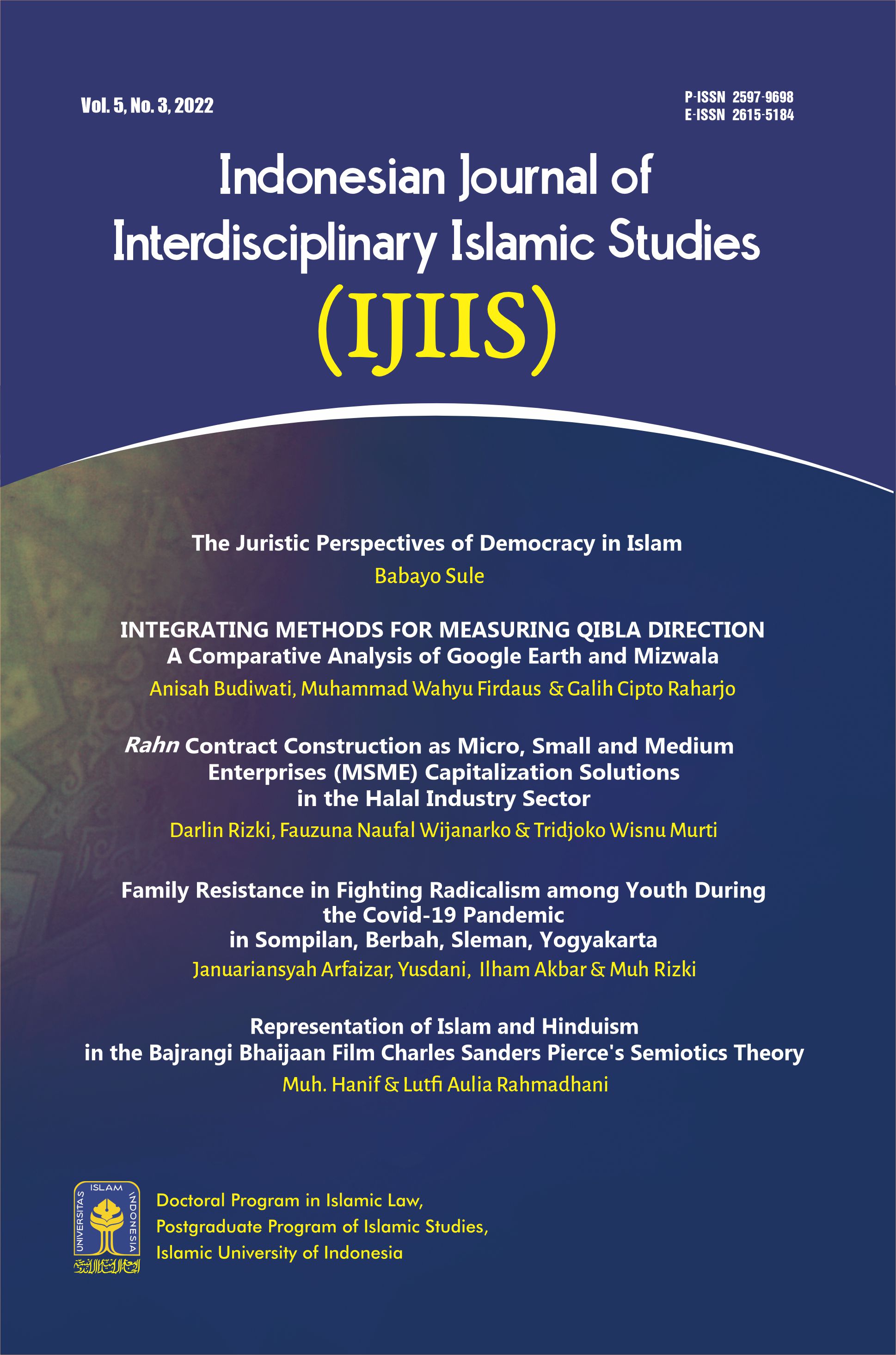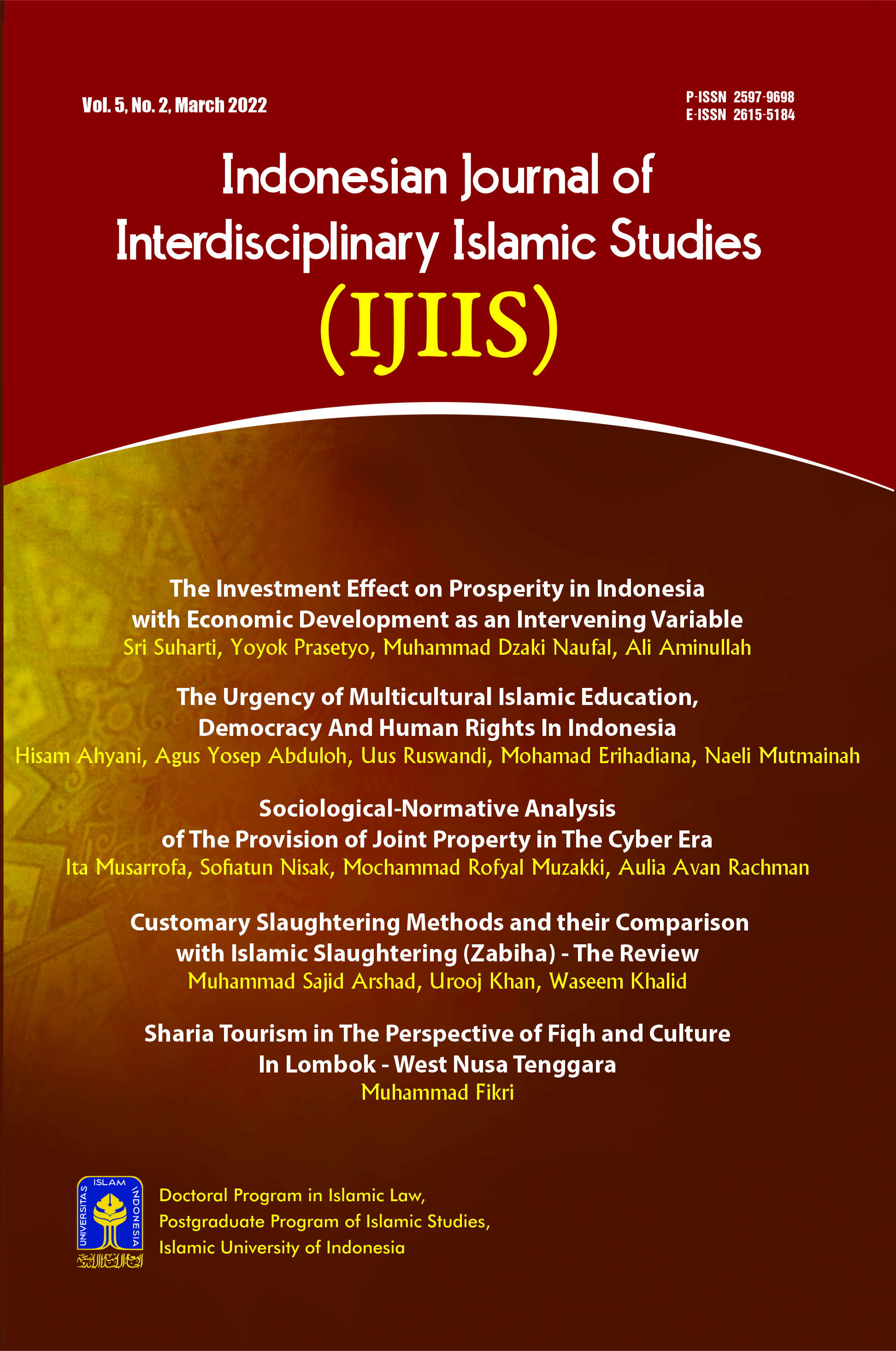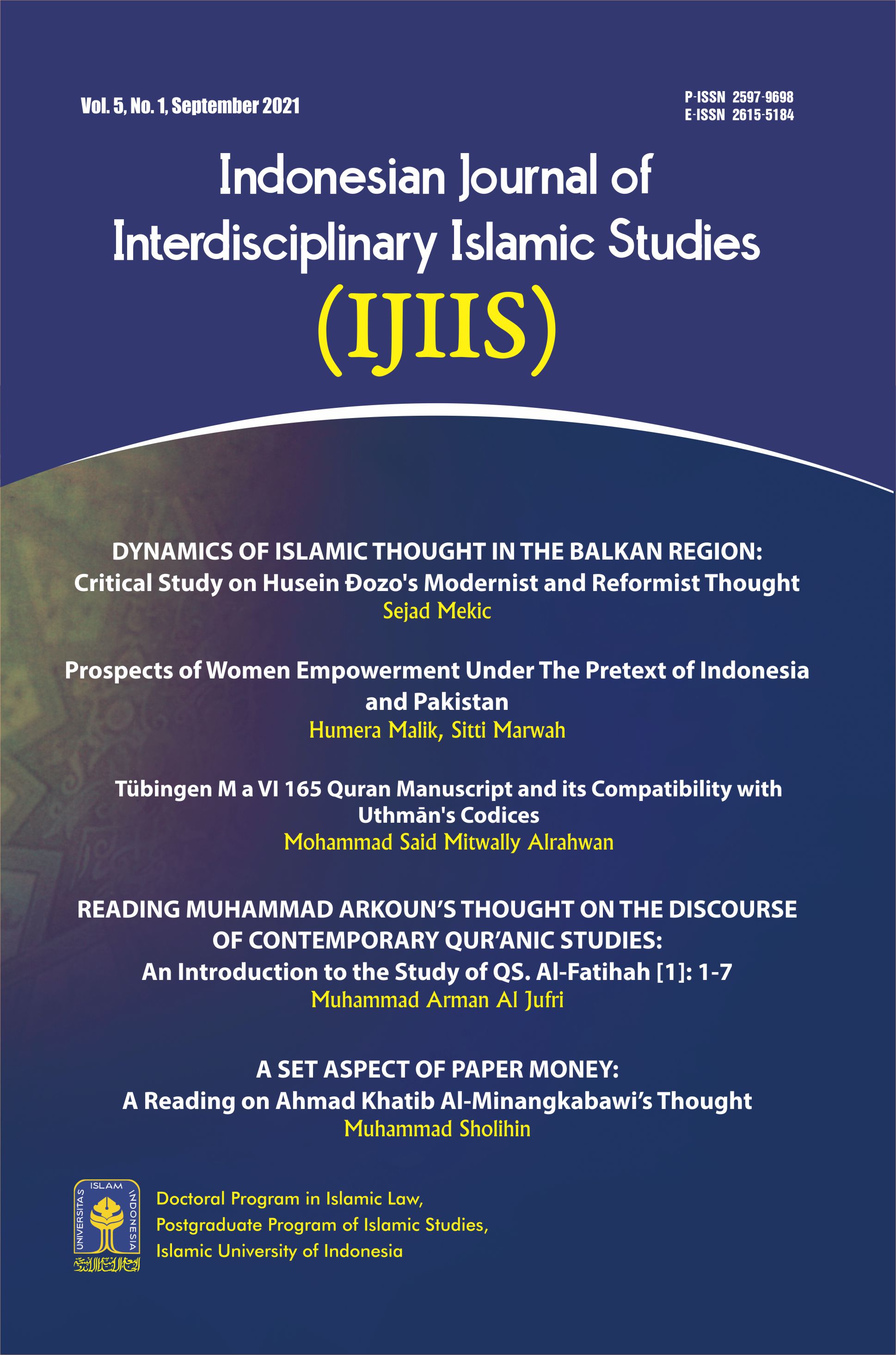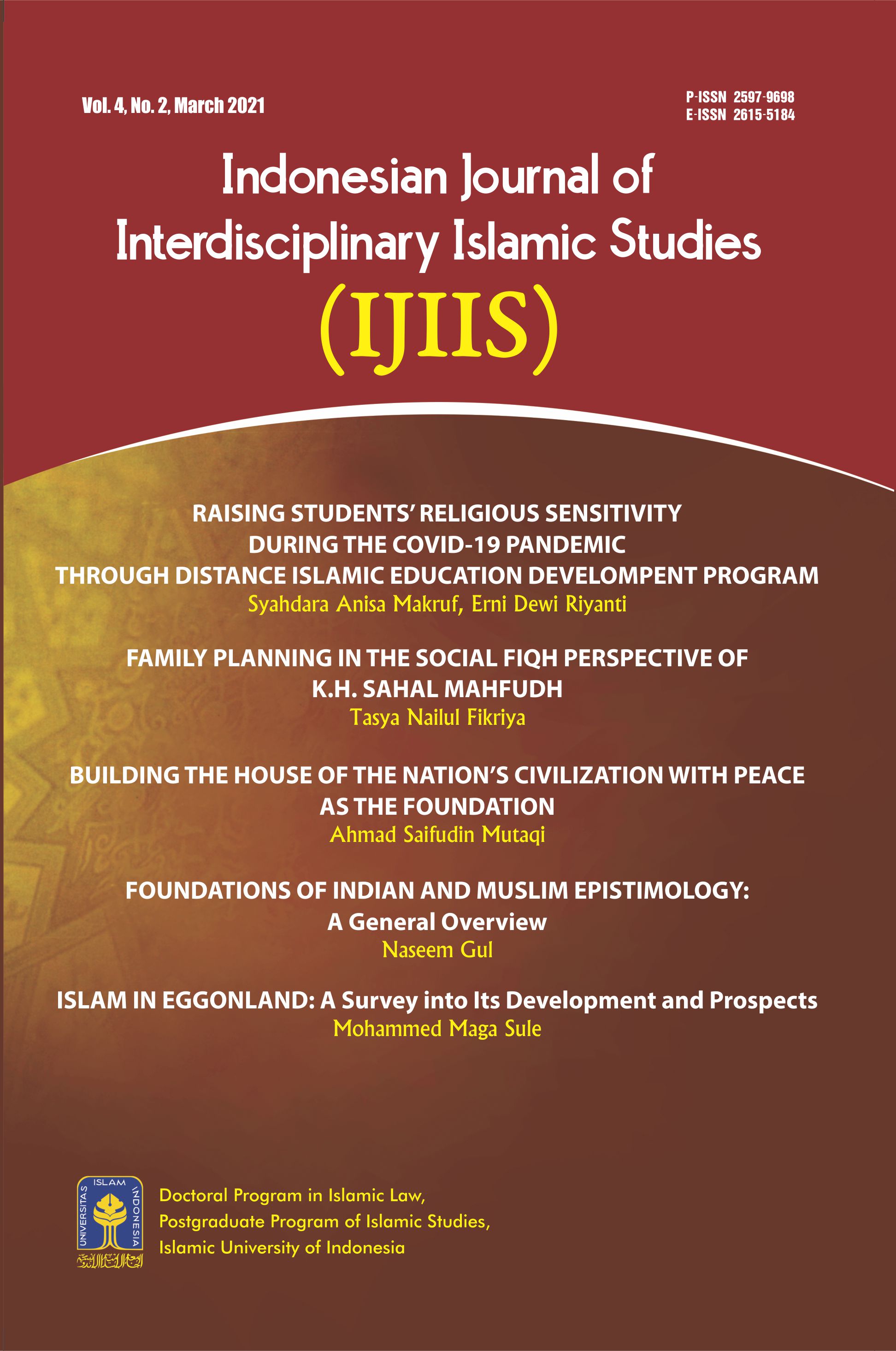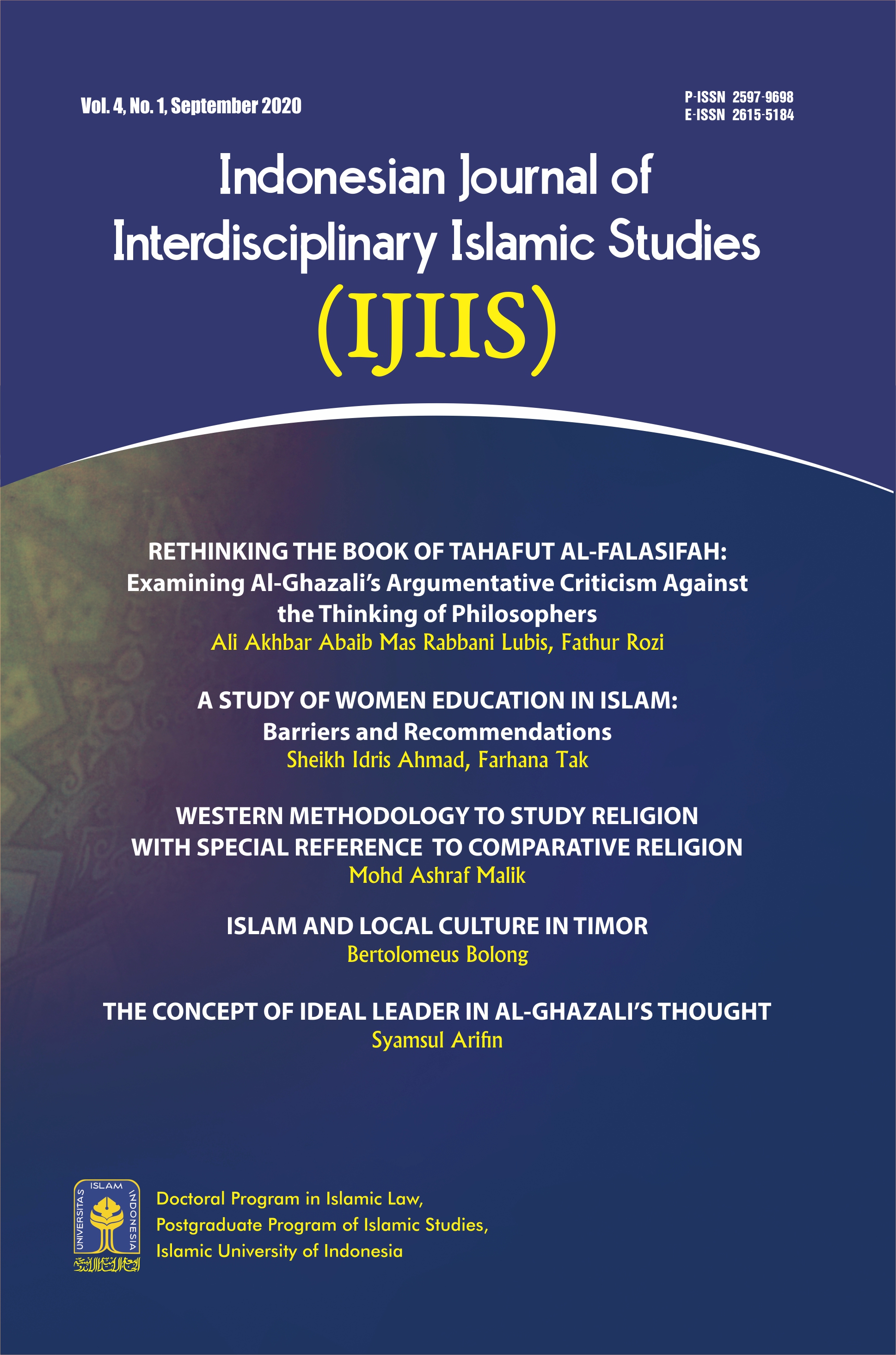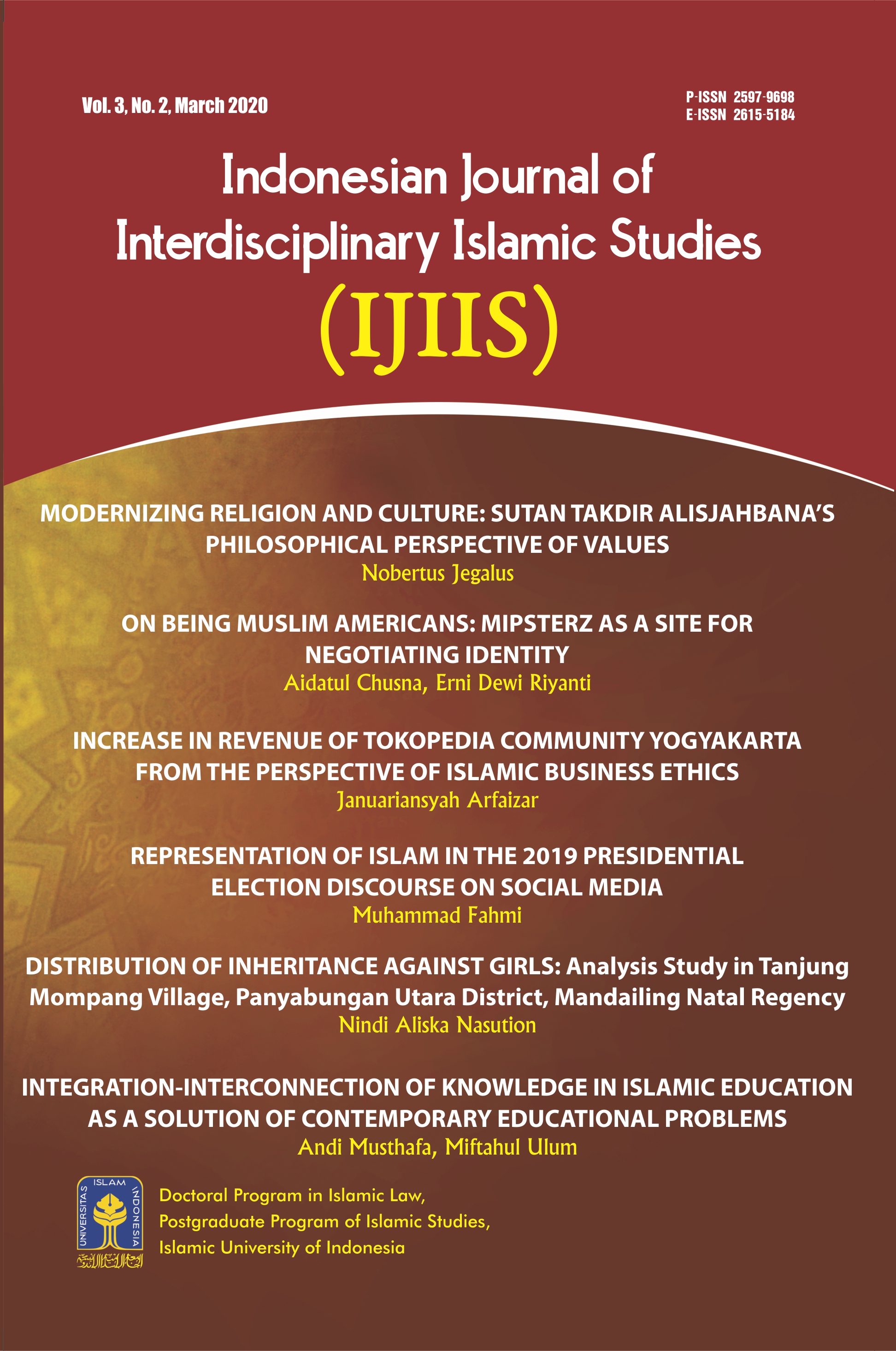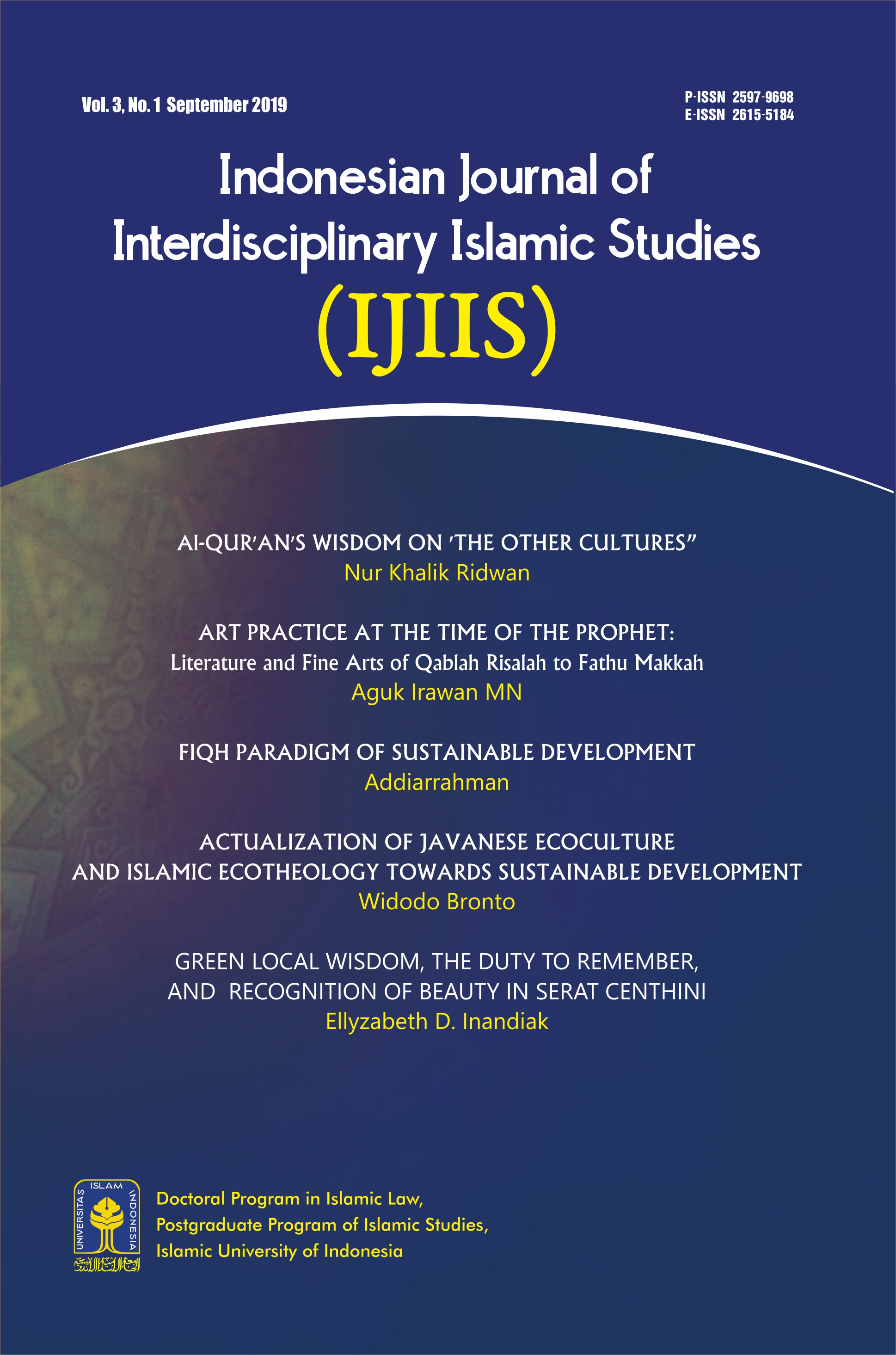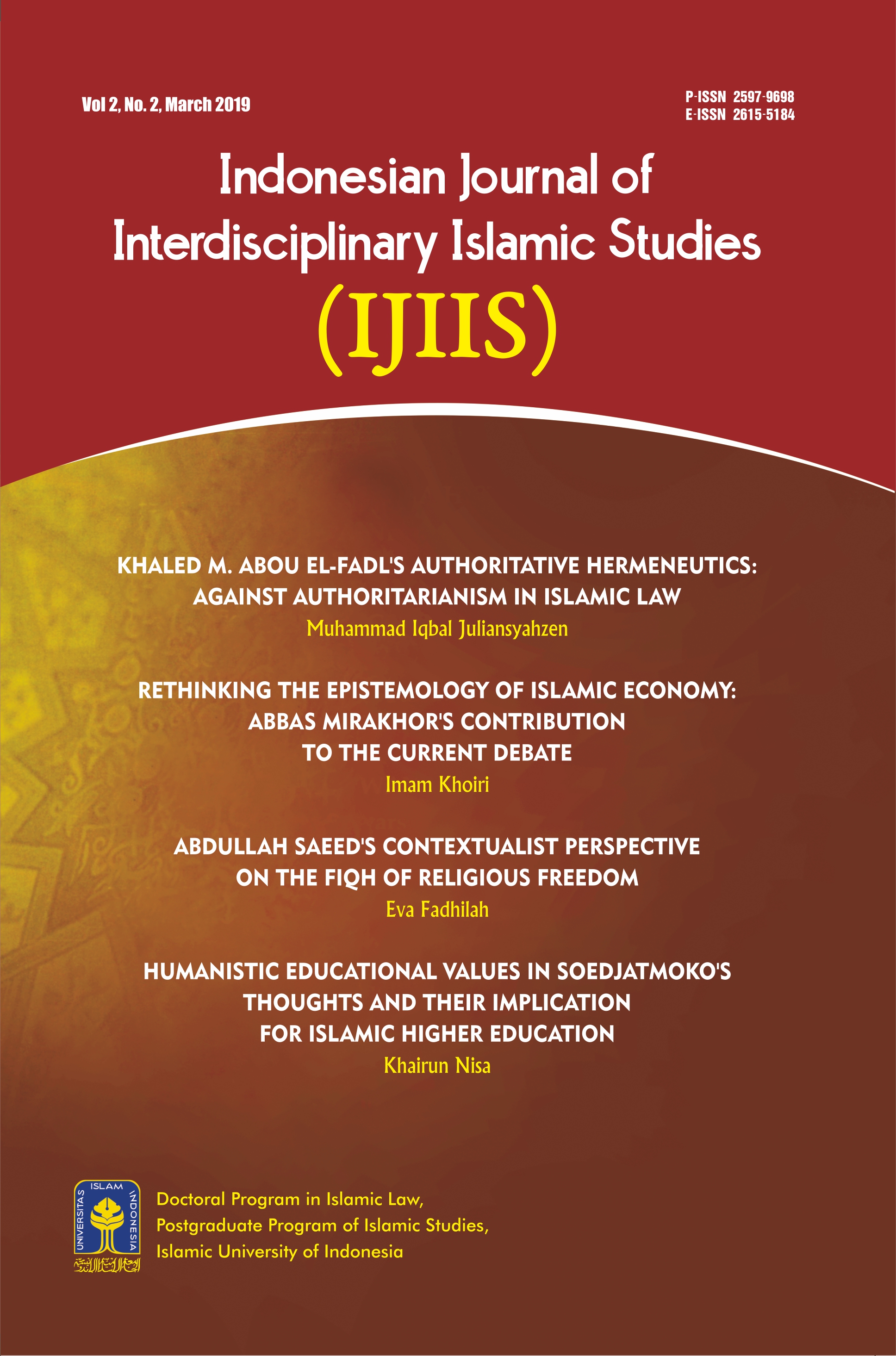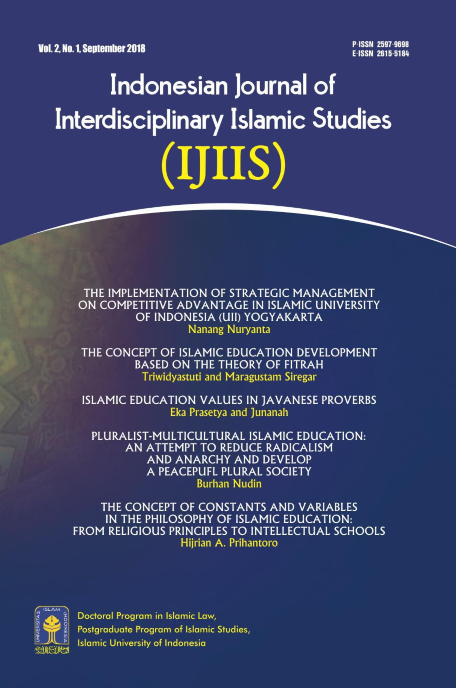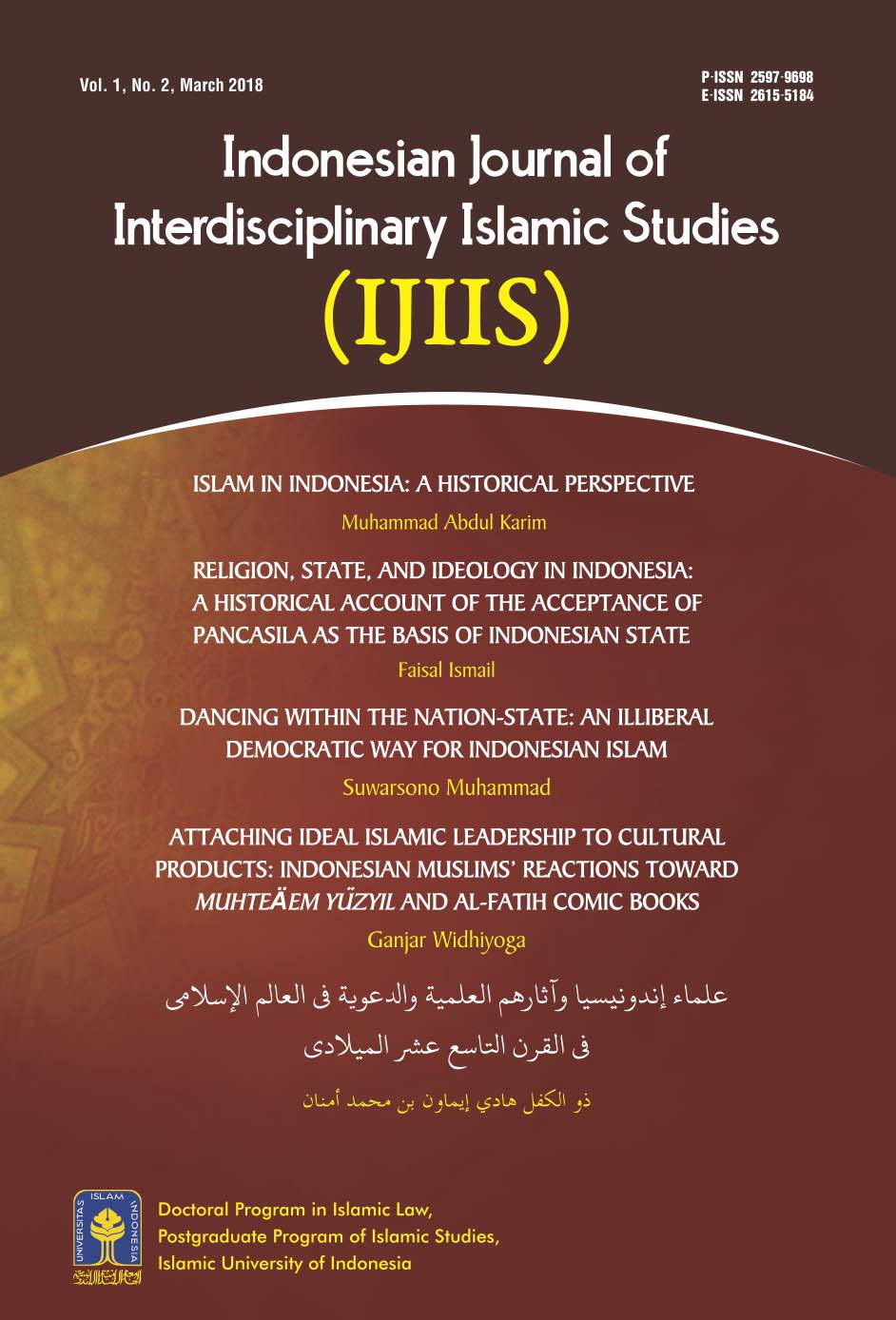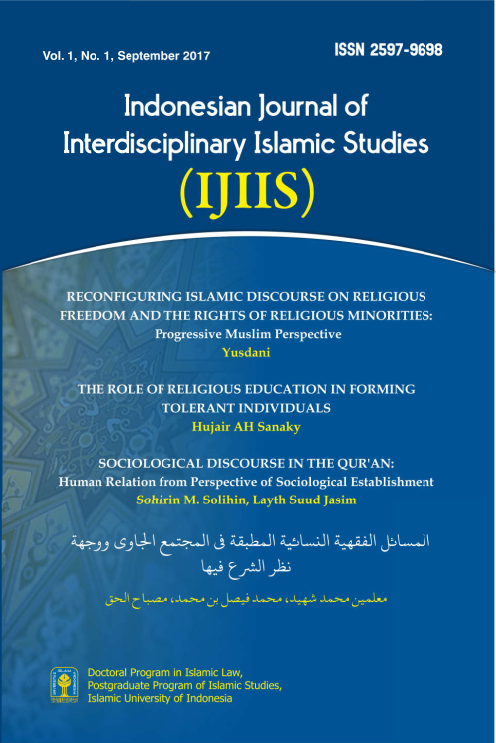Vol. 6, No. 2, September 2023
Published: December 31, 2023
Vol. 6, No. 1, March 2023
Published: September 25, 2023
Vol. 5, No. 3, September 2022
Published: December 29, 2022
Vol. 5, No. 2, March 2022
We are very pleased to present The Indonesian Journal of Interdisciplinary Studies (IJIIS) Vol. 5 No. 2 March 2022. This issue mainly consists of a good mix of selected papers discussing several interesting topics covering the effect of investment, the urgency of multicultural education, and many more.
Published: March 27, 2022
Vol. 5, No. 1, September 2021
We are very pleased to present The Indonesian Journal of Interdisciplinary Studies (IJIIS) Vol. 5 No. 1 September 2021. This issue mainly consists of a good mix of selected papers discussing several interesting topics covering Islamic thought, women empowerment, Quran manuscript and studies, Al-Minangkabawi's thought.
Published: September 29, 2021
Vol. 4, No. 2, March 2021
We are very pleased to present The Indonesian Journal of Interdisciplinary Studies (IJIIS) Vol. 4 No. 2 March 2021. This issue mainly consists of a good mix of selected papers discussing several interesting topics covering Islamic law, religious freedom, Islamic education, Islamic economy and inheritance law.
Published: March 25, 2021
Vol. 4, No. 1, September 2020
We are pleased to present The Indonesian Journal of Interdisciplinary Studies (IJIIS) Vol. 4 No. 1 September 2020. This issue mainly consists of a good mix of selected papers discussing several interesting topics covering Tahafut al-Falasifa, women's education in Islam, western methodology, Islam in Timor, and the concept of an ideal leader in al-Ghazali's thought.
Published: September 24, 2020
Vol. 3, No. 2, March 2020
We are very pleased to present The Indonesian Journal of Interdisciplinary Studies (IJIIS) Vol. 3 No. 2 March 2020. This issue mainly consists of a good mix of selected papers discussing several interesting topics covering Islamic law, religious freedom, Islamic education, Islamic economy and inheritance law.
Published: March 25, 2020
Vol. 3, No. 1, September 2019
We are very pleased to present the Indonesian Journal of Interdisciplinary Studies (IJIIS) Volume 3, No. 1, 2019. This issue mainly consists of selected papers presented in a special seminar held by the Indonesian Journal of Interdisciplinary Islamic Studies (IJIIS) on “Fiqh of Culture: Texts, Locality and Globality” later this year.
The first article by Nur Khaliq Ridwan discusses the Qur’anic perspective on the other culture as the normative foundation for Muslims in dealing with diversity and differences. The second article by
Aguk Irawan NM then looks at the historical practice of art in the time of Prophet to show the early empirical Islamic response to literature and fine arts. Following this, Addiarrahman’s article discusses the
urgency of new fiqh paradigm in supporting sustainable development. This is followed by Widodo Brontowitono’s article on the actualization of the Javanese ecoculture and Islamic eco-theology as one of possible efforts toward sustainable development. In the fifth article, Elizabeth Inandiak reveals some interesting messages in the famous Serat Centhini on green local culture, the duty to remember and recognition of beuaty. The last article by Azrial, Pipin Armita and Muh. Rizki then examines the tradition of Balimau Kasai in Kampar as an example of integration of Islamic values and local culture.
It is hoped that this publication will encourage further research and discussion on various issues concerning Islam and Muslim societies from various disciplinary backgrounds.
Published: September 20, 2019
Vol. 2, No. 2, March 2019
We are delighted to present The Indonesian Journal of Interdisciplinary Studies (IJIIS) Volume 2, No. 2, 2019. This issue mainly consists of a good mix of selected papers discussing several interesting topics covering Islamic law, Islamic economy, religious freedom, Islamic education, and inheritance law. The first article by Muhammad Iqbal Juliansyahzen discusses the authoritative hermeneutics offered by Khaled Abou el-Fadl as an attempt to challenge authoritarianism in Islamic law. The second article by Imam Khoiri then examines the current debate on the epistemological basis of the Islamic economy by referring to the ideas proposed by Abbas Mirakhor. Following this, Eva Fadilah turns to the issue of Islam and freedom and religion by explicitly examining the progressive and contextualist thinking of Australia-based Muslim scholar Abdullah Saeed. The next article by Khairun Nissa then discusses the humanistic educational thought of Soedjatmoko, a prominent Indonesian intellectual and social thinker. The last article by Azmi Siradjudin then examines the practice of the inheritance law among different ethnic groups in Metro city Lampung. This issue is then concluded by a review of Muhammad Yasir Alimi’s “Mediation of Religion, Post-Truth, and National Resilience: The Sociology of Religion in the Digital Age”. It is hoped that this publication will encourage further research and discussion on various issues concerning Islam and Muslim societies from various disciplinary backgrounds.
Published: March 20, 2019
Vol. 2, No. 1, September 2018
We are very pleased to present The Indonesian Journal of Interdisciplinary Studies (IJIIS) Volume 2, No. 1, 2018. This issue mainly consists of selected papers discussing several interesting and interrelated educational topics such as educational management, educational theories development, Islamic multicultural education, culture and Islamic education and the philosophy of Islamic education. In the first article, The Implementation of Strategic Management on Competitive Advantage in Islamic University of Indonesia (UII) Yogyakarta, Nanang Nuryanta discusses the extent to which the principles and steps of strategic management has been applied by the Islamic University of Indonesia in increasing its competitive advantage.
The second article by Triwidyastuti and Maragustam titled The Concept of Islamic Education Development Based on the Theory of Fitrah then looks at the debate on educational theories or philosophies by offering a comparative analysis on the theory of fitrah and the Nativism, Empiricism and Convergence theories. Following this, Eka Prasetya and Junanah’s article, Islamic Education Values in Javanese Proverbs, discusses how certain Javanese proverbs contain Islamic values and how they can be integrated into three centres of education. Following this, Burhan Nudin in his article Pluralist-Multicultural Islamic Education: An Attempt to Reduce Radicalism and Anarchy and Develop A Peaceful Plural Society, discusses more specifically on the importance of developing a pluralist-multiculturalist Islamic education as an alternative approach in eradicating religious radicalism and anarchy.
The last article by Hijrian Prihantoro titled The Concept of Constants and Variables in the Philosophy of Islamic Education: From Religious Principles to Intellectual Schools, examines the concept of constants and variables in Islamic education. This issue is then concluded by a review by Rafiu Ibrahim Adebayo of the book titled “The History and Philosophy of Islamization of Knowledge: A Preliminary Study of Pioneers’ Thought” by Muhammad Mumtaz Ali. It is hoped that this publication will encourage further research and discussion on various issues concerning Islam and Muslim societies from various disciplinary backgrounds.
Published: September 30, 2018
Vol. 1, No. 2, March 2018
The first article, written by Muhammad Abdul Karim, discusses the historical construction and development of a distinctive Indonesian Islam. The second article by Faisal Ismail then critically surveys some defining moments of ideological debates on the relationship between Islam and the state ideology in Indonesia. Following this, Suwarsono Muhammad’s article offers a fresh insight on the fate and trajectory of Indonesian political and cultural Islam in the light of changing political and economic context, especially during the New Order and the Reformasi periods. The next article by Munirul Ikhwan discusses more specifically on how shari’a has been appropriated in the context of modern nation-state, looking at how certain Indonesian Muslim intellectuals develop the discourse of ‘democratic shari’a’. Another important account on how the ideal of Islamic leadership is attached to cultural products is then presented in the next article by by Ganjar Widhiyoga.
This issue also includes another three articles with different focuses. Gowhar Quadir Wani’s article offers some preliminary discussions on Maqashid al-Shari’a while John C. Simon and Stella Y.E Pattipeilohy’s article examines how Mahmoud Mustafa Ayoub’s discourse on Islamic Christology resonates with Christian Christo-praxis. The latest article, written in Arabic by Dzulkifli Hadi Imawan, discusses the role and contributions of Indonesian ulama toward academic and da’wah movements in the Islamic world, especially during the 19th century.
It is hoped that this publication will encourage further research and discussion on various issues concerning Islam and Muslim societies from various disciplinary backgrounds.
Published: February 14, 2019
Vol. 1, No. 1, September 2017
Indonesian Journal of Interdisciplinary Islamic Studies (IJIIS) is a new endeavor of the Postgraduate Program of Islamic Law, Faculty of Islamic Studies, Islamic University of Indonesia to provide a platform for intellectual exchange and dissemination of academic work on various aspects of Islam and Muslim societies by scholars and researchers coming from various disciplinary backgrounds. The main vision of the journal is to promote and facilitate the development of interdisciplinary Islamic studies in Indonesia and beyond.Â
In this very first edition of IJIIS, we are delighted to have eight thought provoking articles written by authors whose interest and focus revolve around various research areas: Islamic thought, education, sociology, and Islamic law.Â
Collectively, these contributions offer fresh perspectives on various issues of Islam and Muslim societies in light of different disciplinary backgrounds. It is hoped that this very first edition of IJIIS will be important contribution to developing better understanding of the complexity and multiplicity of this religion and how it has been interpreted and practiced in different historical and geographical contexts. Finally, as editors, we really hope that our journal will help promote the academic debates and studies on various aspects of Islam and Muslim societies across disciplinary boundaries.
Published: September 1, 2017

